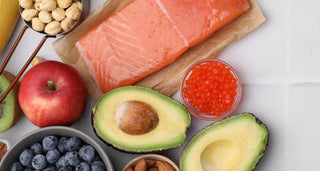A Refined Guide to Skin Wellness Through Nutrition
There is a timeless link between diet and skin. Nourishing the skin through mindful eating is a foundational principle of graceful aging. A well-balanced, antioxidant-rich diet can help preserve collagen, reduce inflammation, and support skin repair at the cellular level. For women over 40, prioritizing these key foods not only enhances outward appearance but also supports energy, mood, and overall well-being.
As skin matures it becomes more susceptible to signs of aging such as dryness, dullness, fine lines, and a loss of elasticity. While topical skincare plays a valuable role in any beauty routine, radiant skin begins from within. A nutrient-rich diet can be one of the most effective and elegant ways to maintain a youthful, healthy complexion.
Here are ten skin-supportive foods that help nourish, protect, and preserve the beauty of aging skin.
Avocados: Avocados are one of the most nutrient-rich foods for aging skin. Packed with monounsaturated fats, they help support the skin’s lipid barrier, keeping it soft, hydrated, and resilient. They are also high in vitamin E, a potent antioxidant that protects against free radical damage and oxidative stress—both major contributors to premature aging. In addition to their healthy fats, avocados contain compounds that help regulate inflammation and promote smoother skin texture. Their naturally occurring biotin also contributes to stronger nails and healthier hair, making them a true multitasker in any skin-supportive diet.
Berries: Deeply pigmented berries such as blueberries, raspberries, and strawberries are brimming with skin-enhancing antioxidants. Most notably, they are rich in vitamin C, which is essential for collagen synthesis—a process that slows with age but is crucial for keeping skin firm and elastic. The polyphenols in berries also offer strong anti-inflammatory benefits and help combat damage caused by sun exposure, pollution, and stress. Including berries in the diet can promote a more even tone, brighten the complexion, and reduce the appearance of fine lines over time.
Fatty Fish: Fatty fish like salmon, mackerel, sardines, and herring are excellent sources of omega-3 fatty acids—particularly EPA and DHA—which help maintain skin's hydration, reduce inflammation, and protect against sun damage. Omega-3s also play a role in preserving the integrity of the skin's cell membranes, keeping skin soft, smooth, and youthful. Fatty fish is also a great source of astaxanthin, a powerful antioxidant found in salmon that has been shown in studies to improve skin elasticity and reduce age spots when consumed regularly.
Leafy Greens: Dark leafy greens such as spinach, kale, arugula, and Swiss chard are nutritional powerhouses. They are rich in skin-protective vitamins A and C, both of which play a key role in cellular turnover and collagen production. Vitamin K also promotes circulation and can help reduce under-eye darkness and puffiness. The chlorophyll found in green vegetables supports detoxification, which can reduce skin dullness and promote a clearer, more vibrant complexion. Regular consumption of greens helps reduce inflammation in the body and contributes to long-term skin clarity and resilience.
Nuts and Seeds: Nuts and seeds offer a concentrated source of skin-supportive nutrients. Almonds and sunflower seeds are particularly high in vitamin E, which helps repair damaged skin and protect it from further oxidative stress. Walnuts are an excellent plant-based source of omega-3s, while pumpkin seeds provide zinc, a mineral essential for skin healing and regeneration. Flaxseeds and chia seeds are rich in alpha-linolenic acid, another form of omega-3 that helps retain moisture in the skin and combat irritation or dryness—common issues in aging skin.
Tomatoes: Tomatoes contain high levels of lycopene, a carotenoid that provides antioxidant protection and is especially beneficial in shielding the skin from harmful UV rays. Lycopene also helps support collagen structure and has been linked to improved skin smoothness and density. When tomatoes are cooked, the body is able to absorb lycopene more efficiently, making them a versatile and beneficial addition to soups, sauces, and slow-roasted dishes.
Sweet Potatoes: Sweet potatoes are rich in beta-carotene, which the body converts into vitamin A. This nutrient supports cell turnover and regeneration, helping to maintain skin thickness and an even tone. Beta-carotene also acts as a natural sun protectant, assisting in the prevention of sun-related aging. In addition to their antioxidant properties, sweet potatoes contain fiber and potassium, which aid in digestion and hydration—two factors that influence overall skin appearance.
Green Tea: Long revered in wellness traditions, green tea contains polyphenols called catechins, which help reduce inflammation, fight oxidative stress, and improve skin elasticity. Regular consumption of green tea has been associated with smoother texture, reduced redness, and improved resistance to environmental stressors. Epigallocatechin gallate (EGCG), the primary active compound in green tea, has also shown promise in supporting collagen production and limiting the enzymes that break down elastin and collagen fibers in the skin.
Dark Chocolate: Dark chocolate, particularly varieties containing at least 70% cacao, is surprisingly beneficial for skin health. Its high flavonol content can improve blood circulation, enhance skin hydration, and provide protection against UV damage. In clinical studies, daily consumption of dark chocolate led to visibly softer, more resilient skin. Moderation is key, but when chosen wisely, dark chocolate can be both a luxurious treat and a functional food for beauty from within.
Water: Though not a food, water is perhaps the most critical component of skin health. Adequate hydration supports every biological function, including circulation, detoxification, and cellular repair. For the skin, water ensures elasticity, reduces the appearance of fine lines, and keeps the complexion plump and luminous. As the skin naturally loses moisture with age, maintaining proper hydration—through both water and water-rich foods—becomes increasingly essential.
Incorporating skin-supportive ingredients into everyday meals reflects a holistic approach to beauty—one rooted in refinement, intention, and the understanding that elegance begins with care from within.














